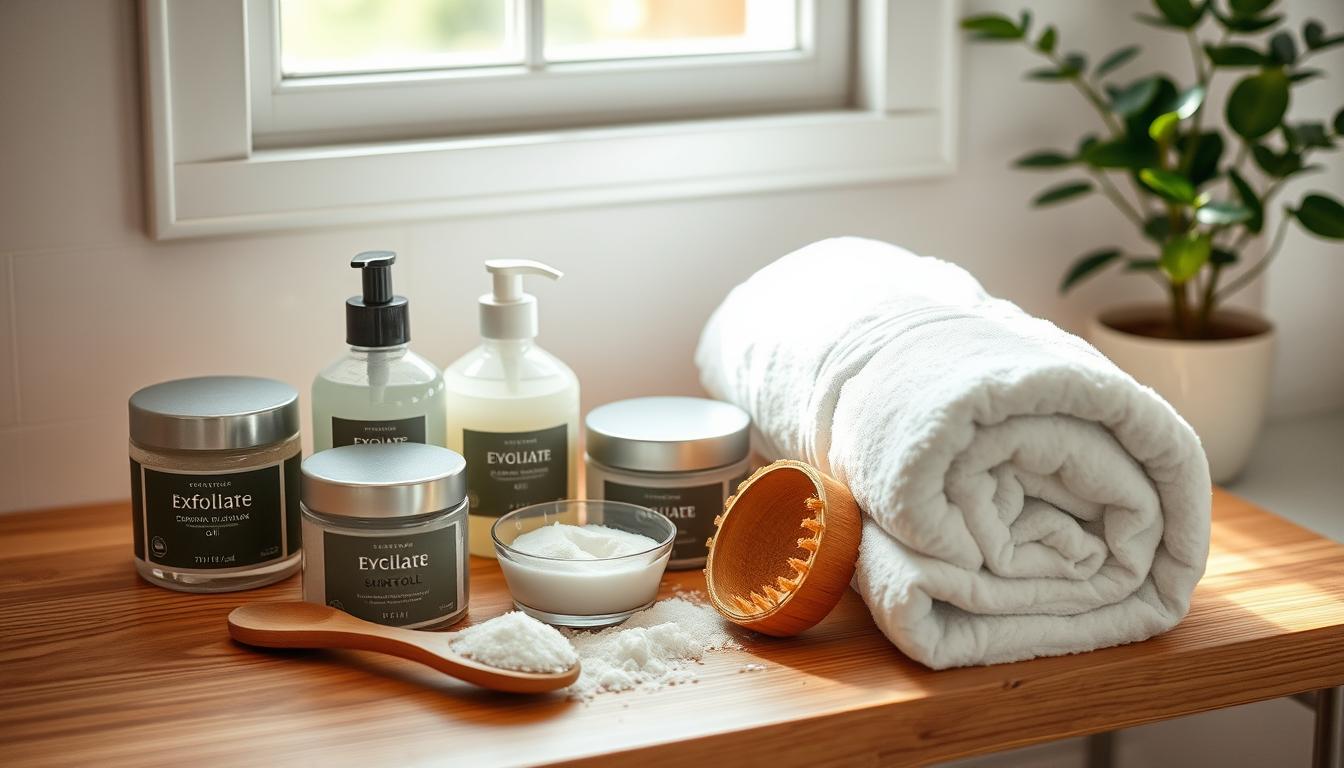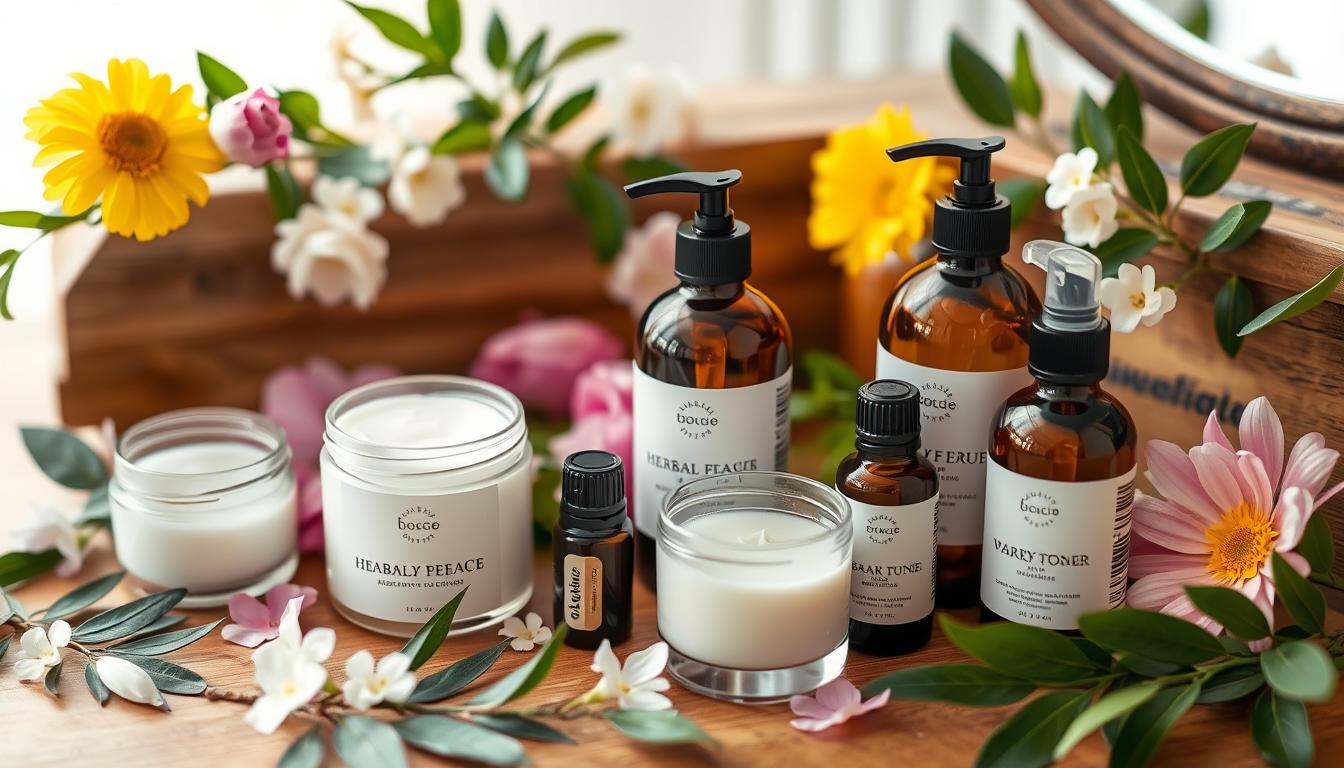Applying sunscreen every day is key to our skincare routine. Sun damage causes premature aging, and sunscreen boosts the effectiveness of our skincare. It’s vital to understand sunscreen’s role in protecting us from UV rays and preventing aging.
Studies show that daily sunscreen users don’t show more aging signs over 4.5 years. This proves how important sunscreen is in our daily skincare. Recognizing sunscreen’s benefits helps us achieve healthy, youthful skin.
Sunscreen is a must in skincare and beauty. It’s important to keep up with skincare trends and know how to use sunscreen daily. This way, we can enjoy the benefits of sunscreen and have a glowing complexion.
Key Takeaways
- Applying sunscreen every day is essential for preventing premature aging and protecting against UV rays.
- The importance of sunscreen in skincare routine is vital for maintaining healthy, youthful skin.
- The benefits of wearing sunscreen daily include preventing sun spots, uneven skin tone, and reducing the risk of skin cancer.
- Using a broad-spectrum sunscreen with an SPF of 30 or higher is recommended for daily use.
- Reapplying sunscreen every two hours is necessary to maintain its effectiveness.
- Incorporating sunscreen into our daily skincare routine can help us achieve a radiant glow and maintain healthy, youthful skin.
Understanding the Importance of Sunscreen in Skincare
Sunscreen is key in skincare. It protects our skin from UV rays, which can cause early aging and skin cancer. Studies show daily sunscreen use lowers the risk of invasive melanomas.
So, why is sunscreen so important for our skin? It stops UV damage, preventing sun spots and skin cancer. With one in five Americans getting skin cancer by 70, sunscreen is vital. It helps us make smart skincare choices and reach our skin goals.
- Reducing the risk of skin cancer
- Preventing premature aging
- Protecting against UV rays
Adding sunscreen to our daily skincare routine offers many benefits. It keeps our skin healthy and glowing. Whether we want to prevent aging or reduce cancer risk, sunscreen is essential.
The Science Behind UV Radiation
It’s important to know how sunscreen protects our skin from UV damage. Sunscreen absorbs or reflects UV radiation. But what are UVA and UVB rays, and how do they harm our skin?
Using sunscreen daily can lower the risk of skin cancer and early aging. For example, SPF 15 sunscreen can cut melanoma risk by half. It also reduces squamous cell carcinoma risk by about 40%.
UVA vs. UVB Rays
UVA rays cause skin aging, while UVB rays cause sunburn. Both can damage skin and raise skin cancer risk. It’s key to pick a sunscreen that blocks both UVA and UVB rays.
How Sunscreen Works
Sunscreen creates a barrier on the skin’s surface. It absorbs or reflects UV radiation. This prevents UV damage and lowers skin cancer and aging risks. Using sunscreen can also make our skin look better.
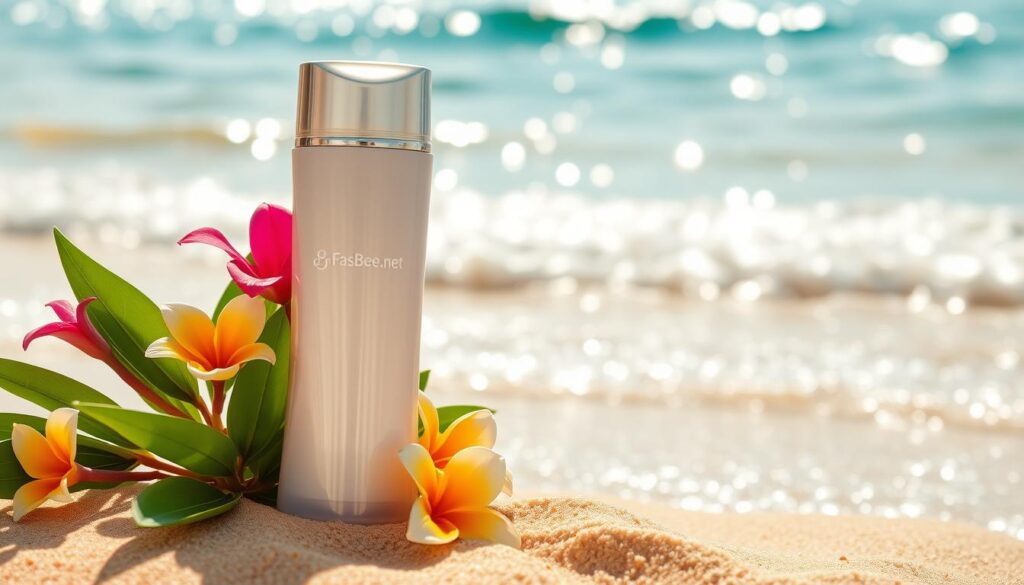
SPF Explained
SPF (Sun Protection Factor) shows how well sunscreen blocks UVB rays. A higher SPF means more protection. For example, SPF 30 is best for long outdoor times and outdoor work.
We should apply sunscreen 30 minutes before going outside. Reapply every two hours or right after swimming or sweating a lot.
| SPF | Protection Level |
|---|---|
| SPF 15 | Reduces risk of melanoma by 50% and squamous cell carcinoma by 40% |
| SPF 30 | Recommended for extended outdoor activities and individuals working outdoors |
Choosing the Right Sunscreen for Your Skin Type
Choosing the right sunscreen is key to protecting your skin. Sun protection is vital to prevent skin cancer. Using sunscreen keeps your skin looking young. For example, choosing the right sunscreen helps prevent aging and reduces cancer risk.
There are sunscreens for every skin type. Oily skin types do well with oil-free sunscreens like EltaMD UV Sport Broad Spectrum SPF 50. Dry skin benefits from moisturizing sunscreens, such as Eau Thermale Avène Solaire UV Mineral Multi-Defense Fluid SPF 50+. Those with combination skin should look for products for normal to combination skin.

Key Considerations for Each Skin Type
- For oily skin: oil-free or mattifying sunscreens
- For dry skin: moisturizing sunscreens with ingredients like hyaluronic acid or glycerin
- For combination skin: products labeled as suitable for normal to combination skin
Choosing the right sunscreen is important for sun protection. It helps prevent skin cancer and keeps your skin young. Always apply sunscreen 15 minutes before going outside. Reapply every two hours or as needed.
How to Incorporate Sunscreen into Our Daily Routine
Remembering to use sunscreen every day is key. It helps prevent early aging and lowers skin cancer risk. Always apply sunscreen, even on cloudy days, and reapply every two hours or after swimming or sweating.
For proper application, use about a teaspoon of sunscreen for your face. Choose a sunscreen that fits your skin type. This could be oil-free for oily skin or hydrating for dry skin. These tips help you enjoy sunscreen’s benefits and keep your skin looking young.
Some important sunscreen application tips include:
- Apply sunscreen 15-30 minutes before going outside
- Reapply every 2 hours or after swimming or sweating
- Use a broad-spectrum sunscreen with an SPF of at least 30
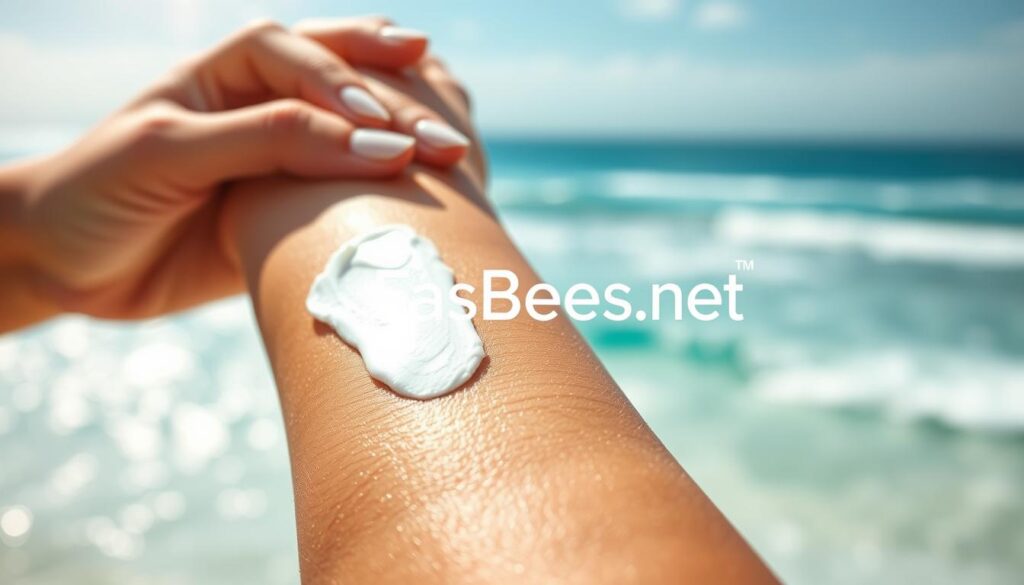
By making sunscreen a daily habit, we lower our skin cancer risk and prevent early aging. Sunscreen is essential for any skincare routine, as it offers many benefits.
| Skin Type | Sunscreen Recommendation |
|---|---|
| Oily Skin | Oil-free sunscreen |
| Dry Skin | Hydrating sunscreen |
| Combination Skin | Balanced sunscreen |
Common Myths About Sunscreen
There are many myths about sunscreen that can confuse us. One big benefit of wearing sunscreen daily is protecting our skin from UV rays. These rays can cause early aging and increase skin cancer risk. Yet, some think high SPF means better protection, or that water-resistance means no need to reapply.
The American Academy of Dermatology says to use broad-spectrum sunscreens with SPF 30 or higher daily. This helps prevent sunburn and lower skin cancer risk.
Another myth is that sunscreen isn’t needed on cloudy days. But, up to 80% of the sun’s harmful UV rays can get through even on cloudy days. This makes why sunscreen is essential for skin health very important. UV rays can harm skin in just 15 minutes, so reapplying sunscreen every 2 hours is key, more often if you swim or sweat a lot.
Here are some key facts to keep in mind:
- Broad-spectrum sunscreens protect against UVA and UVB rays.
- UVA rays penetrate deeper and can cause premature aging.
- Reapplication of sunscreen is critical, every 2 hours or more often if swimming or sweating heavily.
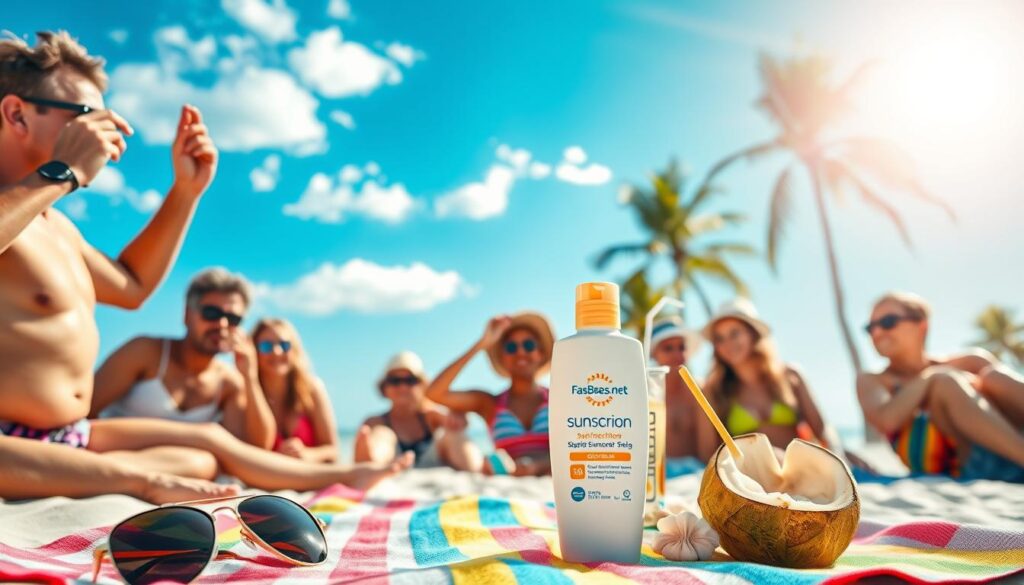
By debunking these myths, we can make better choices for our skin. Remember, sunscreen helps keep our skin looking young and is vital for everyone, not just those with fair skin.
The Role of Sunscreen in Seasonal Skincare
Our skincare routine changes with the seasons. Sun protection is key to prevent skin cancer. Using sunscreen helps keep our skin looking young. We should use sunscreen with at least SPF 30, even on cloudy days, to protect against UV radiation.
Many think sunscreen is only for summer. But, sun protection is needed all year. In winter, snow can reflect up to 80% of UV radiation. So, use a broad-spectrum sunscreen with at least SPF 30 in winter to block UVA and UVB rays.
Year-Round Protection
To keep our skincare routine consistent, apply sunscreen 15 minutes before going outside. Reapply every two hours, more often if we’re active. This helps prevent early aging and skin cancer.
Summer Essentials
- Use sunscreen with SPF 60 or greater for outdoor activities
- Apply one ounce of sunscreen to adequately cover the face, neck, arms, and legs
- Reapply sunscreen every two hours, or more frequently after swimming or sweating
By making sunscreen a part of our daily routine, we can protect our skin all year. This helps us enjoy the benefits of sun protection and keeps our skin healthy and youthful.
Trending Sunscreens to Try This Year
Staying current with sunscreen trends is key in our skincare routines. Sunscreen is vital for protecting our skin from harmful rays. With so many choices, picking the right one can be tough. But, by following dermatologists’ advice, we can find the best sunscreen for our skin.
Brands like EltaMD, SkinMedica, and La Roche-Posay are worth checking out. They offer sunscreens with SPF 35 to 50, protecting against UVA and UVB rays. For example, EltaMD UV Sport Broad Spectrum SPF 50 is great for daily use. It’s water-resistant and won’t clog pores.
There are also new sunscreen products with special benefits. The Colorescience Sunforgettable Total Protection Face Shield Flex has 12% zinc oxide. It’s water-resistant for up to 40 minutes, perfect for outdoor lovers. Adding one of these sunscreens to our routine can greatly benefit our skin.
Impact of Lifestyle on Sunscreen Efficacy
Our lifestyle greatly affects how well our sunscreen works. Daily activities can harm our skin, even when we’re indoors. For example, swimming or hiking outdoors increases sun damage risk. Also, UV rays from windows indoors can harm us too.
It’s important to know why sunscreen is key for skin health. Sunscreen helps prevent early aging and lowers skin cancer risk. Using sunscreen with at least SPF 30 daily can protect us from these issues.
Our diet and how much we drink also matter for our skin. Eating foods full of antioxidants and staying hydrated helps our skin fight sun damage. Combining a healthy lifestyle with sunscreen use keeps our skin safe and healthy.
Important lifestyle factors to think about include:
- Outdoor activities and increased sun exposure
- Indoor UV exposure from windows and other sources
- Diet and hydration levels
By considering these factors and making smart choices, we can make our sunscreen work better. This helps us keep our skin healthy and looking great.
How to Reapply Sunscreen Effectively
Reapplying sunscreen is key to keeping your skin safe from UV rays. It’s vital for preventing skin cancer and keeping your skin looking young. To do it right, know when to reapply and what tools to use.
The American Academy of Dermatology suggests using SPF 30 or higher for good protection. You should reapply sunscreen every two hours. But, if you’re outside a lot, you might need to do it more often, like every 40 to 80 minutes.
Here are some tips for reapplying sunscreen effectively:
- Reapply sunscreen at least every 2 hours for effective sun protection.
- Use tools, such as spray sunscreens, for easy application.
- Keep smaller containers of sunscreen for on-the-go application to encourage consistent use.
By following these tips, you can prevent skin cancer and keep your skin looking young. Always pick a broad-spectrum sunscreen with SPF 30 or higher. And don’t forget to reapply often for the best protection.
| SPF | UV Radiation Filtered |
|---|---|
| SPF 30 | 96.7% |
| SPF 50 | 98% |
Embracing a Holistic Skincare Approach
Incorporating sunscreen into our daily skincare routine is key for healthy, youthful skin. But, to get a radiant glow, we need more than just sun protection. We must use sunscreen with other nourishing products and focus on overall skin health.
Using sunscreen with moisturizers, serums, and antioxidants can make it work better. Hydration is important for keeping skin elastic and preventing early aging. Also, skincare products with green tea extract or vitamin C can reduce inflammation and make skin look young and bright.
Being consistent is important for great skin health. Make sunscreen and holistic skincare a habit. This way, we protect our skin from UV rays and tackle issues like fine lines and uneven tone. With a balanced approach, we can enjoy the confidence and beauty of glowing, healthy skin.


